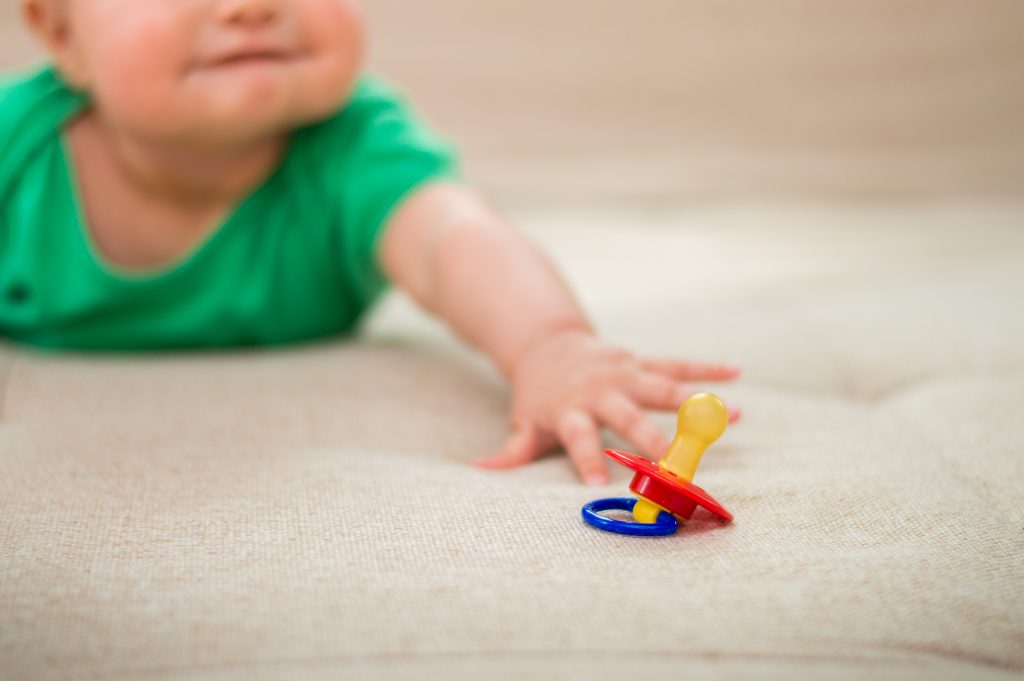Many children get attached to their dummies. Depriving them of this special comforter can be hard work. Here are a few tips to make the transition to being dummy-free smoother.
Giving up dummies can be a very difficult task for children. Sometimes, it can take up to a year until children are willing to give up their favorite comforter. Therefore, experts recommend that parents start weaning their children off using a dummy as early as possible. Starting early, doesn’t only allow parents to use a slower approach, it also reduces the negative effects of using dummies in the long run including bite and teeth problems. Here are 5 simple steps supporting the process.
1. Find the Right Timing
The younger the kids are, the easier it is to ditch the dummy. After their first birthday, toddlers will become increasingly headstrong and averse to change. Consequently, your child’s age and character will have an important impact on the success of the chosen dummy removal strategy. For example, just taking the dummy away may work with a younger baby but can lead to loads of stress with strong-willed toddlers who need a more gradual approach. Additionally, dummies are usually nothing else than a comforter. This means that children might give up their dummies almost automatically when parents find an adequate replacement such as a blanket or a cuddly toy.
2. The Step-by-step Approach
The best idea is to gradually reduce the time your toddler uses the dummy each day. Parents can make a deal such as ditching the dummy when leaving the house. Before such a deal parents need to explain the situation to the child and agree on the deal. When leaving the house, parents can remind their toddlers of the agreement and tell them: „We are going outside now and we agreed to leave the dummy at home“. As an alternative, children may like to take a toy with them. If your child starts demanding the dummy, stay calm, show her the toy and remind her of the deal. Children will learn that they can cope without the dummy and stop asking for it. Once they don’t ask for the dummy outside the house any longer, it’s time to limit the usage of the dummy at other occasions as well.

3. Distractions
There are many ways to distract children from asking for their dummy. Show them a toy, sing a song, or go for a walk with them. When leaving the house, parents can prepare a small box with interesting objects and put it in the handbag. Show them the box whenever it seems that the little one starts to demand the dummy. It’s a good idea to change the items in the box now and then to keep the kids interested. Don’t give in and distract them as often as necessary, otherwise your kids will realize that they can persuade you to hand over the dummy. Be aware of using food as a substitute for the dummy because it will only introduce children to the so-called comfort eater habit which is an unhelpful habit.
4. The Dummy Fairy
When your child is ready to give up the dummy, it is helpful to have a plan in mind to give it away. What about a more creative approach to such a plan? Imaginary characters are always useful when it comes to bargaining with children. This is where the fairy comes in. Rather than just putting it in the bin, parents can let the dummy fairy collect it. Similar to the tooth fairy, the dummy fairy shows up during night time and takes away the old dummy and may even replace it with a small present. In order to make the dummy farewell easier, children can spend an afternoon packing the dummy, addressing it to the fairy and leaving it downstairs for the dummy fairy to collect it at night.

5. No Pressure
It’s impossible to persuade children to give up their dummies overnight. Even if your first attempt is initially unsuccessful, there is no reason to be worried or to push children towards ditching their dummies. Remember that changing a child’s habit usually means that the behavior gets worse before it gets better. Therefore, it’s a good idea to stick to a previously agreed plan and to follow it over a few weeks. It is also important to remember that the amount of time it takes for children to ditch their dummies isn’t a reflection of parenting skills, neither are parents depriving children of love and hugs when they ask their kids to give away their dummies. Finally, there is no need to panic when the transition to a dummy-free life takes longer than a few weeks. Children eventually give up when they feel the time is right, otherwise have you ever seen a child entering the classroom at school with a dummy?

















